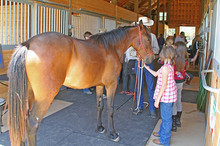Why do people always want youngsters? Sure they are cute, but there is so much to be said for mature horses. A horse in its teens or even twenties can be a perfect match for many horse owners, and there is certainly nothing better for a young beginner or first-time horse owner than a seasoned senior!

Needed: Homes for horses of all ages
A horse in its teens or even twenties can be a perfect match for many horse owners, and there is certainly nothing better for a young beginner or first-time horse owner than a seasoned senior!.
© 2015 by Homes for Horses
Acquiring a young horse is a long-term commitment, which may not be the best idea for those with uncertain future plans. Providing a loving home for a horse in his golden years is no less serious a commitment, but it can be a shorter one.
For those just learning about horse-keeping and riding, an older horse with training and experience under their girth is often a superior choice. Young horses tend to be less steady, and their reactions are not as predictable. They need handlers who can foresee problems. Beginners rarely have the foresight or knowledge it requires to deal with green horses safely.
The novelty of owning a horse can wear-off quickly when you canât get on and ride right away. When reality sets in, horses in these situations often end up in rescues or auctions. Older horses have better focus and are calmer.
They have years of experience with reading humans and other horses and have already learned what it takes to become part of a herd and a family. Some riders shy away from an older horse because they have ambitious future riding goals, but even older horses can become world class competitors. Take Lenamore, who at 20 was part of the bronze-medaling team in the 2012 Olympics.
Rescues offer many healthy and active senior horses in need of good homes, and older horses are often the last to be considered for adoption. Most of these mature horses were once owned and loved by someone; yet, for whatever reason, they were given up or abandoned.
Khalila El Din, a senior Arabian adoptable with Safe Harbor Equine and Livestock Sanctuary is 24 years old, and is a beautiful mover. In her youth she was shown Western Pleasure and then learned to cut cattle. Her elderly owner could no longer afford or physically provide care. This month she was shown in the rescueâs schooling show fundraiser at the Tennessee State Fairgrounds.
Thereâs a misconception that horses that end up in rescue are physically or behaviorally problematic. It is not uncommon, however, for very expensive, well-bred, well-trained horses to lose their homes for a variety of reasons.
Usually those reasons have nothing to do with their behavior or temperament, but rather to the fact that their owners are unable to keep them for reasons including: death of a guardian, riders going off to college, high hay and boarding prices and various lifestyle changes, or simply disenchantment with the hard work involved in caring for a horse.
These horses need homes just as badly as young horses do, and make loyal and loving companions.
"Just like people, horses are living longer and staying active well into their senior years," says Cindy Gendron, Coordinator of The Homes for Horses Coalition. âAdopting a senior horse pays-off in many ways, and youâll feel the rewards every day you spend together. My horse is 25 years old and couldnât be a better trail partner.â
About The Homes for Horses Coalition
The Homes for Horses Coalition is supported by the ASPCA (The American Society for the Prevention of Cruelty to Animals®), the Animal Welfare Institute and The Humane Society of the United Statesâ Jeannie and Jim Dodson Equine Protection Fund.
It is dedicated to ending horse slaughter and other forms of equine abuse, while promoting growth, collaboration and professionalism in the equine rescue and protection community. Find us online at www.homesforhorses.org and on Facebook at http://www.facebook.com/#!/HomesforHorses.
